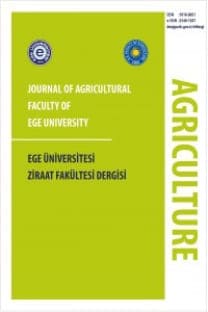Türkiye'de yayım ve cinsiyet
Extension and gender in Turkey
___
- Axinn, G., 1988. Guide on Alternative Extension Approaches, FAO, Rome, Italy, 148p.
- Boyacı, M., Yıldız, Ö., 2011. What changed in public extension in the last decade? The Case of Manisa Province in Turkey, African Journal of Agricultural Research, Vol 6(11)
- Ceylan, İ.C., 2010. Tarımsal Yayım ve İletişim Ders Notları, www.agri.ankara.edu.tr/economy/1182__TYI_DERS_NOTU.doc, Erişim: 02.04.2012.
- Chambers, R., 1994. Challenging the Professions, Frontiers For Rural Development, Intermediate Technology Publications, 143p.
- Dunn, K., 1995. The busiest people in the world. Ceres, 27(4): 48- 52.
- Expere, J.A., 1974. A Comparative Study of Job Performance Under Two Approaches to Agricultural Extension Organization, Land Tenure Centre, Research Paper (61), USA, 62p.
- FAO, 1993. Agricultural Extension and Farm Women in the 1980s, Rome.
- Lahai, B. A. N., Godley, P., Jones, G. E., 1999. The gender of the extension agent and farmers' Access to and participation in agricultural extension in Nigeria, The Journal of Agricultural Education and Extension, 6:4, 223-233.
- Marcotte, P.,1988. Organizational behavior factors: a brief synopsis of leadership motivation and conflict management, Human Resource Management in National Agricultural Research, ISNAR, Report of Workshop, The Netherlands, 168-182pp.
- Oakley, P., Garforth, C., 1992. Guide to Extension Training, FAO Training Series No:11, Rome Italy, 144p.
- Rogers, A., 1993. Third generation extension towards and alternative model, Extension Bulletin (3), The University of Reading, Reading, UK.
- Sigman, A. and Swanson, B.E., 1993. Utilization of technology: the corner stone of agricultural development policy and programmes, Agricultural Extension A Reference Manual, Second Edition, FAO, Rome, Italy. 227-231pp.
- Truit, G. A., 1999. Female agricultural extension agents in El Salvador and Honduras: do they have an impact, Training for agricultural and rural development 1997-98, Ed: Loy Van Crowder, FAO, Rome, Italy.
- ISSN: 1018-8851
- Yayın Aralığı: 4
- Başlangıç: 1964
- Yayıncı: Prof. Dr. Banu YÜCEL
Aydın'da hanehalklarının gıda tüketim talebi ekonometrik analizi
İzmir'de domates üretiminin ekonomik ve teknik etkinlik analizi
Sait ENGİNDENİZ, Görkem ÇOŞAR ÖZTÜRK
Farklı bitki örtüsü altındaki topraklarda mikrobiyal C, N ve P' un mevsimsel değişimi
Hüseyin Hüsnü KAYIKÇIOĞLU, Nur OKUR
Change of mineral element content in the common shrubs of mediterranean zone. II. micronutrients
Mehmet PARLAK, Altıngül PARLAK ÖZASLAN, Ahmet GÖKKUŞ
Aydın ili koşullarında sera ısıtmasında jeotermal enerjinin kullanılabilirliğinin incelenmesi
Bekir Sıtkı KARATAŞ, Ömer Faruk DURDU
Isparta ilindeki soğuk hava depolarının genel özellikleri ve depolamanın elma fiyatı üzerine etkisi
